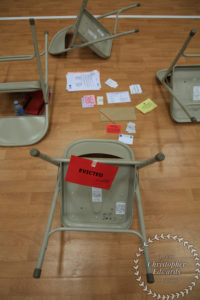MCLP Poverty Simulation
By Sarah Pila
In the United States, too many families continue to live in poverty. On Thursday, October 26, the Multicultural Leadership Program and University of Illinois Extension Office teamed up to provide an inside look at the lives of millions of Americans who live this experience.
“They divide the people up into families, and each family has a profile which tells you who you are, what your primary language is, who works, who is unemployed, who goes to school,” said Linda Bollivar, executive director of MCLP.
The simulation offered real-life alternatives for those living in poverty such as the decision to eat or pay the mortgage on their homes. A month passes by where those involved need to find and pay for transportation, access medical care and face constant discrimination due to their circumstances.

For some participants, it was all too easy to become frustrated. They felt as if they had hit a brick wall as they were turned down for job opportunities or social services funds to keep their families afloat. Some participants were jailed, stolen from, or fired without notice.
The experience was described by many as depressing, but also extremely eye-opening and a valuable resource towards developing empathy for others. One participant said, “We were frustrated and stressed, and this was only an hour. How could we survive days, weeks, months?” which is the reality of many in America.

The live role-playing simulation united many in Bloomington-Normal’s nonprofit sector, companies in the community, and students from both Illinois Wesleyan University and ISU to step into the shoes of others before passing judgment. Linda Bollivar states, “Being frustrated in this system is essentially the point: we hope to provide real examples of those who are forced into a situation and find it impossible to escape or simply do not know how to.”
Participants often described feeling ostracized because of their situation, without a support system. The combined effort of these two programs sheds light on real issues and proposes the need for a united, empathetic community.